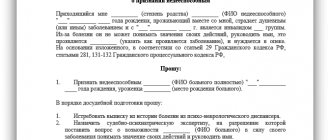Can guardianship authorities really come to any family with a child? Are their actions regulated when inspecting an apartment?
From 07.04. In 2020, Order of the Ministry of Education of Russia dated January 10, 2019 N 4 “On the implementation of certain issues of guardianship and trusteeship in relation to minor citizens” came into force. In which, in particular, the procedure for conducting a survey of the living conditions of a child in a family has been updated.
Why does she come
Guardianship officials may come to check a house where minors live if they have received a message about a threat to the life and health of children.
For example, neighbors said that heart-rending screams could be heard from the apartment for several hours in a row. Or a kindergarten teacher discovered suspicious bruises on the child’s body. Or the doctor at the hospital thought that the baby was too skinny. Guardianship is obliged to respond to all signals. The goal of the inspectors is to protect children, or to make sure that their life and health are not in danger.
If they don't take the child and he then gets hurt, they will be accused of neglect. And if they take away a child without sufficient grounds, they will be accused of abuse of authority.
A threat to the life and health of a child is considered, in particular, by the lack of care appropriate to his age and state of health. For example, if parents do not feed a primary school child or leave the baby alone in the apartment.
Guardianship and trusteeship authorities work only on weekdays. On weekends and at night, the police respond to calls about children in danger. She can remove children as “neglected.”
Neglected children are those whose parents do not fulfill their responsibilities for their maintenance, training and upbringing. (Recently, the Ministry of Internal Affairs proposed to amend the RF IC to allow the police to temporarily move children to a safe place, and not permanently remove them with a mandatory claim for deprivation of parental rights).
How to minimize the likelihood of visits from PLO employees
Of course, it is impossible to completely exclude the possibility of a visit from representatives of the guardianship authorities, since a complaint can be filed on the basis of personal hostility (for example, there was a conflict between neighbors and one of them filed a complaint against the 2nd), however, take actions that will allow It is still possible to reduce the possibility of visiting them to a minimum.
So, in order to avoid a visit from the PLO, it is recommended:
- Show the child to medical specialists in a timely manner (if he is being seen in a private clinic, the local police officer at the place of residence must be notified of this) and give the necessary vaccinations.
- Prevent the use of violence against a child, both physical and mental.
- Provide proper care for the child - his clothes must be clean, selected in accordance with weather conditions, in addition, he must always be fed and well-groomed (clean hair, trimmed nails, etc.).
- Do not leave a small child alone - both at home and in public places.
- Receive documents for the child in a timely manner.
- Warn the teacher (teacher, educator) if children attend sports clubs where there is a possibility of injury and abrasions (for example, football, wrestling, etc.). Otherwise, any bruise or abrasion may be perceived by the teacher as the result of unlawful actions against the child.
- Maintain the home in proper sanitary conditions.
- Do not abuse alcohol and do not use drugs.
In addition, it is recommended that you familiarize yourself with it, because in addition to the above conditions, it contains others, the identification of which may lead to a visit by the PLO and subsequent deprivation of parental rights.
Is it possible not to allow guardianship representatives into the house, and what will happen to this?
A citizen has the right not to allow guardianship and trusteeship officials into his home. But this approach can have two consequences.
On the one hand, not opening the door to strangers is not a crime. The guardianship staff will write in the report on the inspection of living conditions that they were not provided with access to the living quarters. But they will not be able to criticize the sanitary condition of the apartment and document the lack of ready-made food.
Finally, they will not be able to take the child to a shelter where he will be questioned by strangers. After all, it is unknown how outsiders, even experienced and competent ones, will interpret children’s stories, and how this information will be used later, in court about the deprivation of parental rights.
On the other hand, guardianship officials who receive a signal that a child is in danger may call the police. And the police, if they consider the threat real, will break down the door. After which the child can still be taken away.
Moreover, if it turns out that the parents are not at home at that moment, even if there are other adults (for example, a grandmother) in the house, the child may be considered neglected.
Alternatively, you can try through the door to schedule another day for the visit in order to better prepare, or arrange a meeting on the territory of the guardianship authority.
Families with natural children
There is an opinion that guardianship specialists visit families to select children. However, almost always birth families are ready for visits by specialists from the guardianship department.
Parents know very well the reasons for the commission’s appearance on the doorstep:
- conflict with a spouse during divorce;
- conflict with teachers;
- problems with neighbors;
- refusal of vaccinations or alternative treatment of the child;
- a signal from an organization or from outsiders.
Often a sudden visit is caused by a signal from neighbors or third parties. Not less often, the examination is provoked by dissatisfied relatives.
Example . The guardianship department received a signal from citizen D. that her son’s ex-wife has been intoxicated for 3 days, there is no food in the house, and the children come to her after school. It is impossible to take clean clothes for school and textbooks from home. A newborn daughter is with her mother. Specialists from the guardianship department left on a signal. When visiting the residential premises, it turned out that the information was not true. The woman shows no signs of alcohol intoxication, the housing is in order, and food for the children is available. As the mother of the children explained, she and her husband are in the process of divorcing. The mother-in-law wants the children to stay with their father. Therefore, I repeatedly made such reports to various authorities.
What will guardianship officials do in the apartment?
The group of officials who came to check the living conditions of the family, in addition to representatives of the guardianship and trusteeship authority, may include employees of the commission for minors, social services, clinics and police.
Each of them must introduce themselves. But special attention should be paid to the representative of the guardianship and trusteeship authority, because he has the greatest powers.
Inspectors will assess the condition of the apartment: whether it needs cosmetic or major repairs. They will look to see if the house is clean, if the minor has a place to study and relax, if there are seasonal clothes hanging in the closet, if there are food products in the refrigerator “appropriate for the child’s age.”
Of course, their opinion will be subjective: anyone can say that the floor is not cleaned well, there is not enough space to play, and pasta and stew are not suitable for feeding a preschooler. But parents can still prepare for the visit of guardianship officials - by tidying up, for example.
In addition to cleanliness and order in the house, the commission will be interested in the following points:
– family income (according to the law, the difficult financial situation of parents cannot be the only reason for taking children away)
- alcohol or drug addiction of parents;
– presence or absence of a criminal record;
– whether other children from this family are being raised in orphanages;
– whether the parents were brought to administrative responsibility;
– psychiatric status of the parents (people registered in a psychoneurological dispensary can raise children if they are not deprived of legal capacity);
Having clarified the situation on all these points, the guardianship officer will ask questions related to the upbringing, maintenance, treatment and education of children that he deems necessary.
Requirements for the child’s place of residence
The requirements for an apartment or residential building in which a child lives are determined by the Procedure for conducting a survey of the living conditions of minors, approved by Order of the Ministry of Education No. 4 of January 10, 2019.
According to paragraphs. 6.1 - 6.4 of this document, the residential premises in which the child lives must meet the following requirements:
- living condition of the apartment or house;
- area and number of rooms in an apartment or house (according to the number of residents);
- improvement of living space, availability of repairs, furniture, household appliances, communications, electricity and water supply, heat;
- order and cleanliness in all rooms, absence of dampness, foreign odors, parasites (rats, bedbugs, flies, cockroaches), fresh bedding and clean dishes;
- safety (according to the child’s age: no risk of falling or injury, no access to electrical appliances, gas, sharp objects, instruments, medicines);
- the presence of a separate place (room or furnished area) for sleep, leisure, play, education of the child under his care;
- availability of food and/or ready-made food (according to the age of the child under care);
- availability of hygiene items (diapers, soap, washing powder).
Who has the right to dialogue with guardianship representatives?
Let's say that guardianship workers come to the house, and there is a grandmother, grandfather, aunt or older sister with the child, and not the parents.
Any capable people permanently residing in the apartment can open the door and answer questions, because this is a check of living conditions, and not of the mother or father of the child.
Whether or not the absence of parents will affect the conclusions of the guardianship officers depends on the age of the child. If both mother and father are at work, and the child is one month old, this can be regarded as neglectful attitude towards upbringing. And if a child is 17 years old, then he can live without adults for several days.
Lawyers advise drawing up a power of attorney with a notary, confirming the authority of the person who cares for the child.
There you need to specify exactly what actions the trustee can perform. In particular, it is important in the document to mention the right to consent to medical procedures.
In fact, only legal representatives can sign consent to medical intervention, and this right cannot be delegated to anyone. But, if a child suddenly gets sick, he needs emergency surgery, and the parents cannot sign the consent, the only option for doctors is to turn to those persons who have power of attorney to make such decisions.
Parents who went on a business trip and did not take care of registering a power of attorney will appear in the eyes of the guardianship as not fulfilling their responsibilities.
Parents must enter into a service agreement with the nanny looking after the child. But if they go on a business trip, then you need to understand that for the guardianship authorities, a two-year-old child left with a nanny for a week is in a critical situation.
If parents leave for a long time, say for a year, they must take care of establishing temporary guardianship of the child for the period of their absence.
If the mother of a baby, who cannot be left unattended even for a minute, ends up in the hospital for a month, this is also a situation when temporary guardianship needs to be established. The guardian can be a blood relative of the child, for example, a grandmother.
Powers of OOP
First of all, it is necessary to determine the list of powers of representatives of the PLO - it is contained in “On Guardianship and Trusteeship”. In accordance with this article, the key powers of the guardianship authorities include:
- Identification of persons who need guardianship or guardianship. Carrying out activities aimed at establishing guardianship or guardianship over such persons.
- An appeal to a judicial authority in order to recognize a citizen as limited or completely incapacitated, or, on the contrary, capable, if the contrary was previously established.
- Control over the activities of trustees and guardians, as well as organizations where incapacitated or partially capable persons are located.
- Forced removal or voluntary release of trustees and guardians from their duties.
- Issuance of permits for transactions with property owned by wards.
- Drawing up agreements for trust management of the property of wards.
- Representation of the interests of incapacitated (partially capable) citizens and minors, if the actions of trustees or guardians contradict the norms of current legislation (including if they refuse to protect the interests of their wards).
- Selection of guardians from among citizens who have expressed a corresponding desire.
- Conducting an inspection in order to identify the conditions in which wards are kept, as well as compliance with their rights and legitimate interests on the part of trustees/guardians.
Who should I call for help, and is it possible to record the conversation?
At home, any persons whom the child’s legal representatives deem necessary to invite can be present during the conversation with the employees of the guardianship authority. Because this is their home. It will not be possible to bring a large “support group” to the territory of the guardianship authority.
It is most useful to invite a lawyer who specializes in family or property law to the meeting.
If the guardianship authority’s claims are related to medical issues, you can ask the child’s attending physician for support.
A doctor is also needed in cases where the health status of a minor may worsen during communication with representatives of the guardianship authority. For example, if the child has a palliative status.
Official communication between parents and guardianship officials may be recorded.
Any person present can make an audio or video recording of a conversation.
Information obtained as a result of audio or video recording can be used in court, even if the participants in the conversation were not warned about the recording in advance.
Complaint about the actions of the PLO
Often during visits, guardianship workers behave inappropriately:
- They are rude to citizens.
- They violate hygiene rules (they enter the apartment wearing shoes and outerwear).
- They open cabinets and inspect the personal belongings of citizens.
- They are trying to forcibly enter the house without any reason and without the presence of police officers.
In this case, citizens have the right to videotape, with the help of which it will then be possible to confirm this fact and then file a complaint.
The complaint is made in writing and usually contains the following information:
- Name of the authorized body and full name. leader.
- Information about the person filing the complaint (full name, address, telephone number).
- Document's name.
- Description of the circumstances, the occurrence of which became the reason for writing the complaint.
- Information about the organization and the employee against whose actions the complaint is being made.
- List of attached documents.
- Date of document preparation and signature.
A complaint can be made to the head of the authorized body (ABO) or submitted to the prosecutor's office. When handing over the document in person, it is recommended to draw up a document in 2 copies - hand over the 1st to the authorized body, and put a mark of acceptance on the 2nd and keep it with you. Once received, the complaint will be considered within the time limits established by law, after which the applicant will be notified of the decision made.
Also, if there are significant violations on the part of guardianship officials, you can call the police. After the call, the police will come and find out all the circumstances.
Are there any special rules for communication with representatives of the guardianship authority?
The style of communication with employees of the guardianship authority should depend on the nature of the visit. There are routine checks, for example, in foster families. Parents are warned about them in advance, and then communication can take place even in a friendly manner.
In a situation where a representative of the guardianship authority checks a signal about a threat to the life and health of a child, it is recommended to answer dryly, to the point, supporting each statement with evidence and documents.
There is no need to get ahead of the commission's questions. A parent’s statement that he is not an alcoholic, has no criminal record, and enrolled his child in school on time will cause unnecessary suspicion. It is better to report this when the guardianship officer asks.
But the commission must be informed in advance about the child’s individual characteristics.
Let's say a five-year-old child may wet himself, or start screaming, hitting his head against the wall, falling flat on the floor, and all this is not due to cruel treatment, but to the state of his health.
Members of the commission must understand the reasons for what is happening and know that the parents are involved in the treatment or rehabilitation of the child.
You should not behave emotionally, take an overly active defensive position, or, conversely, attack guardianship representatives.
Each family has its own way of life, its own rules and habits, and this is normal. The guardianship staff needs to calmly explain everything: the floor in the apartment is dirty because renovations are underway, but they will end soon; The mother is not at home because she is at work, but the grandmother is looking after the child.
The most constructive option is written communication.
If parents really made mistakes, they may harm themselves by trying to hastily explain the situation or justify themselves to the guardianship officials. After all, it is unknown how their words will be interpreted in the act drawn up by the official. And correspondence with a government agency allows you to discuss with a lawyer both the requirements of the guardianship authority and your answers.
Frequency of inspections
Checking the child’s living conditions can be carried out either based on signals from third parties or on a planned basis. In the second case, there is a frequency with which such examinations are carried out. Typically, routine checks are organized in families where an adopted child lives.
The frequency of surveys of the living conditions of a child in guardianship families is as follows:
- the first review takes place 30 days after guardianship has been assigned;
- in the first year of living in a new family, quarterly checks are carried out;
- further examination is carried out every six months.
If the PLO authorities receive a signal about a violation of the rights and living conditions of a child, then the employees of this institution have the right to conduct an unscheduled inspection with the availability of an appropriate order.
The families where the adopted child lives are also periodically checked, namely:
- the first check is carried out 5-7 months after adoption;
- the second check is carried out 11-13 months after adoption;
- the next one – in 23-25 months;
- further, after 35-37 months.
The frequency of subsequent checks will be determined individually for each family.
The worst thing that can happen
If the guardianship decides that the child is in danger, he may be taken away. After selection, according to the Family Code of the Russian Federation, a claim for deprivation of parental rights must be filed in court.
The grounds for deprivation of parental rights are chronic alcoholism or drug addiction, child abuse, abuse of parental rights and “lack of concern” for the health and education of children, as well as their “physical, mental, spiritual and moral development.”
How exactly one can “not care” about the spiritual development of children is, of course, not spelled out in the law. And abuse of parental rights is when a child is not sent to school, is persuaded to beg or steal, is offered alcoholic drinks, etc.
For adoptive parents, instead of deprivation of parental rights, the adoption is cancelled, and for adoptive parents and guardians - removal from duties.
When preparing the material, we sought advice from
Alexandra Marova , director of the Charitable Foundation for the Prevention of Social Orphanhood, and Pavel Denisov , lawyer of the Volunteers to Help Orphans Charitable Foundation.
Illustrations by Dmitry Petrov using photo chronicles from TASS and RIA Novosti.
Similar situations that may occur:
- How can you sell a share in an apartment?
- What rights does the son have to the apartment?
- How to get your husband's relatives banned from seeing your child
- Drawing up a preliminary purchase and sale agreement with the allocation of a share to the child
- Getting information about your child
- Do I have the right to withdraw money from the bank upon reaching 18 years of age?
You can appeal an action (inaction) or a decision of the guardianship authorities in court. According to the Code of Civil Procedure of the Russian Federation: Article 254. Filing an application to challenge a decision, action (inaction) of a government body, local government body, official, state or municipal employee
1. A citizen or organization has the right to challenge in court a decision, action (inaction) of a government body, local government body, official, state or municipal employee if they believe that their rights and freedoms have been violated. A citizen or organization has the right to appeal directly to the court or to a higher authority in the order of subordination, a local government body, an official, a state or municipal employee.
2. The application is submitted to the court under the jurisdiction established by Articles 24 - 27 of this Code. An application may be submitted by a citizen to the court at the place of his residence or at the location of the state authority, local government body, official, state or municipal employee, the decision, action (inaction) of which is being disputed.
The refusal of permission to leave the Russian Federation due to the fact that the applicant is aware of information constituting a state secret is disputed in the relevant supreme court of the republic, regional, regional court, court of a federal city, court of an autonomous region, court of an autonomous district at the place of acceptance decisions to leave the request to leave without satisfaction.
3. An application by a serviceman challenging a decision, action (inaction) of a military command body or commander (chief) of a military unit is submitted to a military court.
4. The court has the right to suspend the effect of the contested decision until the court decision enters into legal force.
Article 255. Decisions, actions (inaction) of state authorities, local governments, officials, state or municipal employees, subject to challenge in civil proceedings
Decisions, actions (inaction) of state authorities, local government bodies, officials, state or municipal employees, contested in civil proceedings include collegial and individual decisions and actions (inaction), as a result of which:
the rights and freedoms of a citizen are violated;
obstacles have been created to the citizen’s exercise of his rights and freedoms;
a citizen has been unlawfully assigned any duty or has been unlawfully held accountable.
Article 256. Time limit for filing an application with the court
1. A citizen has the right to apply to the court within three months from the day he became aware of a violation of his rights and freedoms.
2. Missing the three-month deadline for filing an application with the court is not grounds for the court to refuse to accept the application. The reasons for missing a deadline are clarified at a preliminary court hearing or court hearing and may be grounds for refusing to satisfy the application.
Article 257. Consideration of an application to challenge a decision, action (inaction) of a government body, local government body, official, state and municipal employee
1. The application is considered by the court within ten days, and by the Supreme Court of the Russian Federation - within two months with the participation of a citizen, head or representative of a government body, local government body, official, state or municipal employee whose decisions, actions (inactions) are disputed.
(as amended by Federal Law dated June 28, 2009 N 128-FZ)
(see text in the previous edition)
2. The failure of any of the persons specified in part one of this article, duly notified of the time and place of the court hearing, to appear at the court hearing is not an obstacle to the consideration of the application.
Article 258. Court decision and its implementation
1. The court, having recognized the application as justified, makes a decision on the obligation of the relevant government body, local government body, official, state or municipal employee to eliminate in full the violation of the rights and freedoms of a citizen or the obstacle to the exercise by a citizen of his rights and freedoms.
2. The court decision is sent to eliminate the violation of the law to the head of the state authority, local government body, official, state or municipal employee, whose decisions, actions (inaction) were challenged, or to a higher authority in the order of subordination, official, state or municipal employee within three days from the date the court decision enters into legal force.
3. The court and the citizen must be notified of the execution of the court decision no later than within a month from the date of receipt of the decision. The decision is executed according to the rules specified in part two of Article 206 of this Code.
4. The court shall refuse to satisfy the application if it finds that the contested decision or action was taken or performed in accordance with the law within the powers of a state authority, local government body, official, state or municipal employee and the rights or freedoms of the citizen were not violated.
The procedure for removing a child from the family
The actions of the trustee commissions occur according to a certain scheme:
- a signal or complaint is received from respectable citizens;
- carry out inspections in compliance with legal requirements;
- Having identified minor violations, they issue a warning to the careless mother or father;
- when relevant serious violations are identified, minors are removed under the supervision of the state;
- following the requirements of the law, children are placed in state educational institutions “orphanages” or placed under the temporary guardianship of close people who have the right to care and raise the child.
If your child was taken away, you have the opportunity to challenge the conclusions of municipal structures legally.
Sources
- https://zen.yandex.ua/media/opekarf/za-chto-mogut-zabrat-rebenka-organy-opeki-prichiny-poriadok-posledstviia-5cd9c5fa0de4a600b3dadc58?feed_exp=ordinary_feed&from=channel&rid=1593549368.476.1578827486140. 55591&integration=publishers_platform_yandex
- https://urpomosh03.ru/semejnoe-pravo/usynovlenie-opeka-i-popechitelstvo/mogut-li-organy-opeki-prijti-bez-preduprezhdeniya
- https://allo-urist.com/chto-proveryaet-opeka-pri-osmotre-kvartiry/
- https://law-divorce.ru/chto-proveryaet-opeka-pri-osmotre-kvartiry/
- https://prozakon.guru/semejnoe-pravo/zashhita-prav/chto-proveryayut-organyi-opeki-pri-proverke-zhilishhnyih-usloviy.html
- https://www.miloserdie.ru/article/k-vam-prishla-opeka-chto-delat-instruktsiya-dlya-roditelej-i-opekunov/
- https://LegalFAQ.ru/semejnoe-pravo/roditelskie-prava/organy-opeki-skazali-chto-pridut
- https://jurist24.com/%D0%BF%D1%80%D0%B0%D0%B2%D0%B0-%D1%80%D0%BE%D0%B4%D0%B8%D1%82% D0%B5%D0%BB%D0%B5%D0%B9-%D0%B8-%D0%B4%D0%B5%D1%82%D0%B5%D0%B9/%D0%B7%D0%B0 %D0%BA%D0%BE%D0%BD%D0%BD%D0%BE%D0%B5-%D0%BF%D1%80%D0%B5%D0%B4%D1%81%D1%82% D0%B0%D0%B2%D0%B8%D1%82%D0%B5%D0%BB%D1%8C%D1%81%D1%82%D0%B2%D0%BE-%D0%BD%D0 %B5%D1%81%D0%BE%D0%B2%D0%B5%D1%80%D1%88%D0%B5%D0%BD%D0%BD%D0%BE%D0%BB%D0%B5 %D1%82%D0%BD%D0%B8%D1%85/%D0%B7%D0%B0%D0%BA%D0%BE%D0%BD%D0%BD%D1%8B-%D0%BB %D0%B8-%D1%82%D1%80%D0%B5%D0%B1%D0%BE%D0%B2%D0%B0%D0%BD%D0%B8%D1%8F-%D0%BE %D0%BF%D0%B5%D0%BA%D0%B8-%D0%BF%D1%80%D0%B8-%D0%BF%D0%BE%D0%BA%D1%83%D0%BF %D0%BA%D0%B5-%D0%B4%D0%BE%D0%BC%D0%B0/
[collapse]
Is it necessary to sign a document drawn up by guardianship specialists?
First, you should pay attention to the name of the document. An inspection report must be drawn up. Other document names are not correct. The act must be drawn up in two copies. Commission specialists and the citizen sign. There should be no blank fields. Therefore, before signing, it is advisable to check the correctness of filling. If there are empty columns, then you need to put a dash there.
The second copy, signed by the inspectors, remains with the person being checked.







